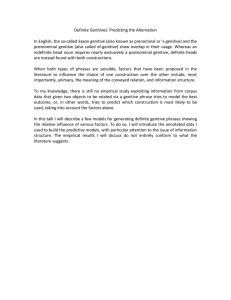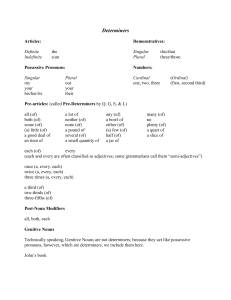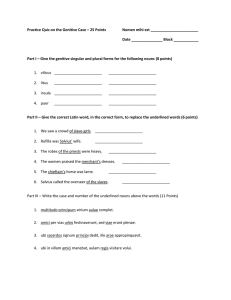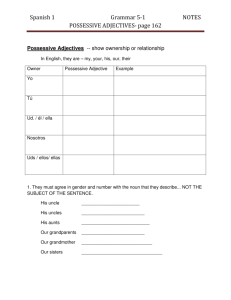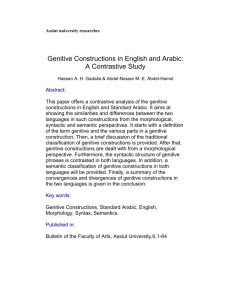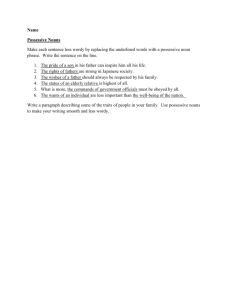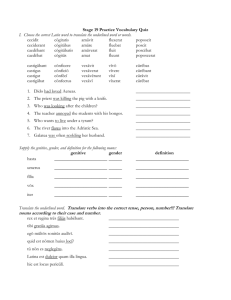Figuring Out Genitive Case
advertisement
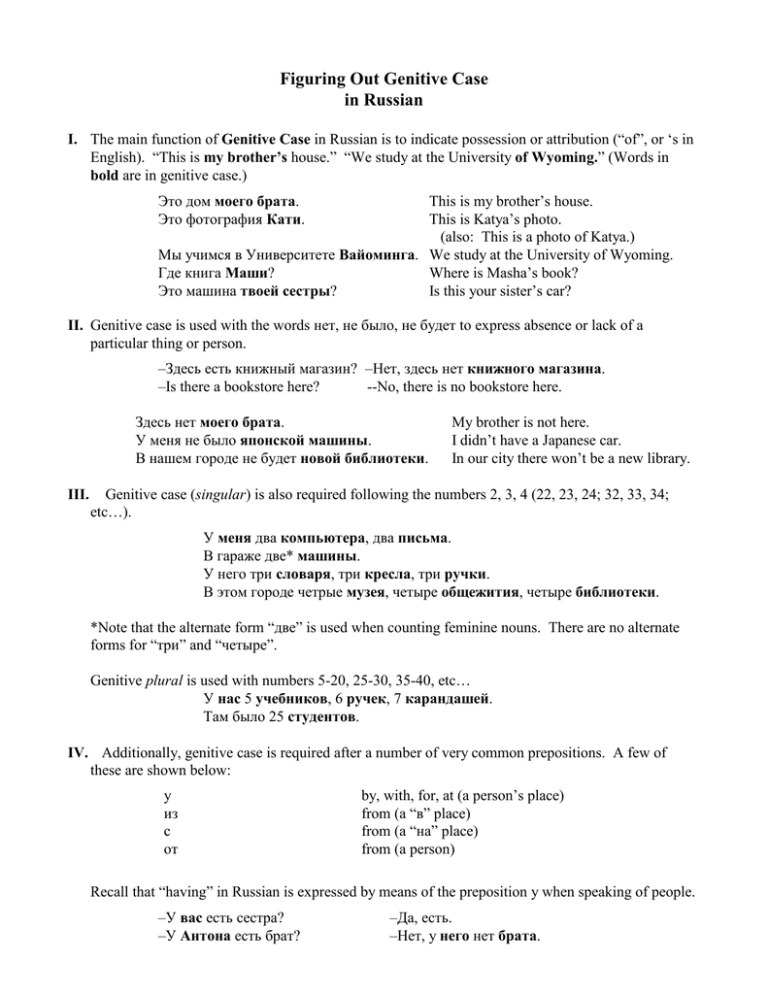
Figuring Out Genitive Case in Russian I. The main function of Genitive Case in Russian is to indicate possession or attribution (“of”, or ‘s in English). “This is my brother’s house.” “We study at the University of Wyoming.” (Words in bold are in genitive case.) Это дом моего брата. Это фотография Кати. This is my brother’s house. This is Katya’s photo. (also: This is a photo of Katya.) Мы учимся в Университете Вайоминга. We study at the University of Wyoming. Где книга Маши? Where is Masha’s book? Это машина твоей сестры? Is this your sister’s car? II. Genitive case is used with the words нет, не было, не будет to express absence or lack of a particular thing or person. –Здесь есть книжный магазин? –Нет, здесь нет книжного магазина. –Is there a bookstore here? --No, there is no bookstore here. Здесь нет моего брата. У меня не было японской машины. В нашем городе не будет новой библиотеки. III. My brother is not here. I didn’t have а Japanese car. In our city there won’t be a new library. Genitive case (singular) is also required following the numbers 2, 3, 4 (22, 23, 24; 32, 33, 34; etc…). У меня два компьютера, два письма. В гараже две* машины. У него три словаря, три кресла, три ручки. В этом городе четрые музея, четыре общежития, четыре библиотеки. *Note that the alternate form “две” is used when counting feminine nouns. There are no alternate forms for “три” and “четыре”. Genitive plural is used with numbers 5-20, 25-30, 35-40, etc… У нас 5 учебников, 6 ручек, 7 карандашей. Там было 25 студентов. IV. Additionally, genitive case is required after a number of very common prepositions. A few of these are shown below: у из с от by, with, for, at (a person’s place) from (а “в” place) from (a “на” place) from (a person) Recall that “having” in Russian is expressed by means of the preposition у when speaking of people. –У вас есть сестра? –У Антона есть брат? –Да, есть. –Нет, у него нет брата. –У Марии есть словарь? –Какое у нас задание на завтра? –Нет, у неё нет словаря. –У нас на завтра никакого задания нет. When speaking of non-living entities, as in “Does this city have a library?” it is best to use a prepositional phrase construction with в or на. Two possible English equivalents are shown below: –В этом городе есть библиотека? –Нет, в этом городе нет библиотеки. –Does this city have a library? –No, this city has no library. (–In this city is there a library?) (–No, in this city there is no library.) V. Genitive case is used, as well, for various expressions involving characteristics or quality, such as “What color…?”, “What gender…?”, “What aspect…?”, and “What case …?” –Какого цвета эта ручка? –Какого рода слово “словарь”? –Какого вида глагол “читать”? –Какого падежа слово “газету”? What color is this pen? What gender is the word “словарь”? What aspect is the verb “читать”? What case is the word “газету”? VI. A final note on possessive marking vs. pluralizing in English: In addition to indicating possession, English also utilizes final –s as a plural marker: students, cars, sisters, etc., but this is not identical in function to possession: student’s,friend’s, or students’, friends’. This competing use of –s to mark simple plural versus possessive singular or possessive plural is a common writing problem, even (maybe especially) for native speakers of English. The following questions show the use of simple plurals with Russian equivalents: Where are the students? Где студенты? Where are our friends? Где наши друзья? The above questions are clearly different in structure from the possessive (singular) sentences below. (Note that there is only one student, and one friend, respectively): Where is this student’s textbook? Где учебник этого студента? Where is our friend’s house? Где дом нашего друга? Compare with plural possessive (“students” and “friends” are both plural, but are also possessive): Where are these students’ textbooks? Где учебники этих студентов? Where are our friends’ houses? Где дома наших друзей? Additional note: in English, ‘s is of course also used for contractions of the words “is” or “has”: Where’s he going? Where’s she gone? In the case of “it’s” vs. “its”, the issue has been resolved by fiat – “it’s” is the contracted form of “it is” or “it has”, and “its” is possessive. This is in line with the forms “his”, “hers”, “theirs” which also show possession (rather than contraction), so it is logical to assign the competing contracted meaning to “it’s”. By the way, the common inclusion of apostrophe in English in cases like this: “I have two TV’s” “He was born in the 70’s”, while virtually ubiquitous, is most likely incorrect. In both cases the –s is simply functioning as a plural marker, rather than as possessive marker. On the other hand, some may rightfully argue that “TV” and “70” are contracted forms of “television” and “seventy” and, therefore, deserve the use of the apostrophe. We can probably agree that “-s” is overused as a functional marker, but it does seem likely the correct forms would read “I have two TVs” and “He was born in the 70s”. This weighty matter may need to be settled by a higher power – an English major or professor! Luckily, Russian has no hair-splitting issues of this particular sort! VII. Summary of Genitive Singular Case endings (genitive endings are shown in bold type): MASCULINE NOUNS -а / -я Nominative Genitive брат отец профессор человек преподаватель Валерий братa отца профессора человека преподавателя Валерия парк язык университет музей словарь парка языка университета музея словаря MASCULINE SPECIAL MODIFIERS & ADJECTIVES -ого / -его мой твой наш ваш этот весь моего твоего нашего вашего этого всего новый маленький плохой большой хороший синий нового маленького плохого большого хорошего синего NEUTER NOUNS письмо слово окно отчество место платье поле море упражнение общежитие -а / -я письма слова окна отчества места платья поля моря упражнения общежития NEUTER SPECIAL MODIFIERS & ADJECTIVES моё -ого / -его моего твоё наше ваше это всё твоего нашего вашего этого всего новое маленькое плохое большое хорошее синее -ого / -его нового маленького плохого большого хорошего синего FEMININE NOUNS мама газета ручка книга машина страна Анна дыня лаборатория Мария Россия ночь мать дочь -ы / -и мамы газеты ручки книги машины страны Анны дыни лаборатории Марии России ночи матери (irreg.) дочери (irreg.) FEMININE SPECIAL MODIFIERS & ADJECTIVES моя твоя наша ваша эта вся -ой / -ей моей твоей нашей вашей этой всей новая маленькая плохая большая хорошая синяя -ой / -ей новой маленькой плохой большой хорошей синей VIII. GENITIVE CASE OF INTERROGATIVE & PERSONAL PRONOUNS Nominative кто что я ты он оно она мы вы они Genitive кого чего меня тебя (н)его * (н)его * (н)её * нас вас (н)их * *These forms add the “н” when used as objects of genitive prepositions such as у, из, с, от. For example: У него есть дача. У неё нет мобильника. У них двое детей. He has a dacha. (lit: For him there is a dacha.) She doesn’t have cellphone. (lit: For her there is no cellphone.) They have two children. (lit: For them there are two children.) Here него, неё, них most literally mean him, her, and them, thus they are personal pronouns. Compare with these close alternates where the nouns following его, её, их are the objects: У его брата есть дача. У её сына нет мобильника. У их друга двое детей. His brother has a dacha. (lit: For his brother there is a dacha.) Her son doesn’t have a cellphone. (lit: For her son there is no cellphone.) Their friend has two children. (lit: For their friend there are two children.) Here его, её, их mean his, her(s), and their(s), making them possessive pronouns. (They are not the object of the preposition у, but rather modifiers for брата, сына, друга, respectively, which are the objects of the preposition у.
